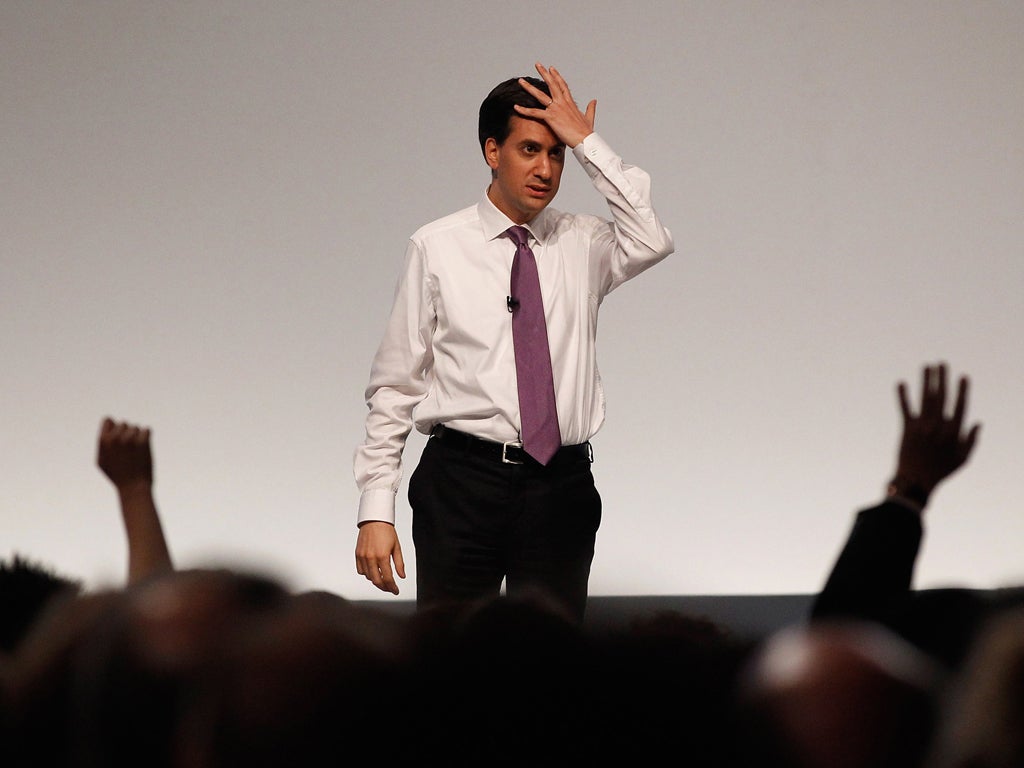Andrew Grice: Tories cheered Ed's shift to the left – but he may have last laugh
Inside Westminster


Your support helps us to tell the story
From reproductive rights to climate change to Big Tech, The Independent is on the ground when the story is developing. Whether it's investigating the financials of Elon Musk's pro-Trump PAC or producing our latest documentary, 'The A Word', which shines a light on the American women fighting for reproductive rights, we know how important it is to parse out the facts from the messaging.
At such a critical moment in US history, we need reporters on the ground. Your donation allows us to keep sending journalists to speak to both sides of the story.
The Independent is trusted by Americans across the entire political spectrum. And unlike many other quality news outlets, we choose not to lock Americans out of our reporting and analysis with paywalls. We believe quality journalism should be available to everyone, paid for by those who can afford it.
Your support makes all the difference.David Cameron judged Ed Miliband's Labour conference speech to be "a left-wing lecture".
As the Labour leader vowed to use the tax and regulatory systems to slay the "predators" exploiting Britain's "fast buck" culture, sources close to Mr Cameron say he believes Mr Miliband made a fatal error: in a global economic crisis, politicians should help business, not attack it.
Senior Tories cheered when an unfortunate pause in Mr Miliband's speech allowed some delegates to cheer him for saying he is "not Tony Blair" and boo the mention of Mr Blair's name. As one Tory minister put it: "If Labour turns its back on Blair, it can wave goodbye to Middle England – and the next election."
"We've gone back to John Smith," one downcast Blairite told me. Mr Smith, the Labour leader who died in 1994, would almost certainly have led Labour to victory in 1997 as the Tories had lost their economic credentials, though he would probably not have won New Labour's landslide. Mr Smith was a social democrat whose cautious approach to modernisation frustrated his successors.
He would have liked this week's Miliband speech. Mr Smith promised full employment, was reluctant to curb trade union power and, as shadow Chancellor, proposed higher taxes and spending, contributing to Labour's 1992 election defeat. It is no coincidence that a year ago, in the same Liverpool conference hall in which Mr Miliband spoke, Vince Cable set out what he sees as a milder, more pragmatic version of "responsible capitalism". The Liberal Democrat Business Secretary was once an adviser to... the same John Smith.
Mr Blair occasionally flirted with the approach set out by Mr Miliband, but never for long. As Opposition leader in 1996, Mr Blair seemed to back the "stakeholder economy" favoured by the economist Will Hutton. "It lasted for 72 hours," a former Blair aide recalled in Liverpool this week.
Mr Blair and Mr Brown preferred to leave business alone, content to use tax revenues from a lightly regulated City of London to boost spending on public services. Labour ministers realised the limitations of laissez-faire: a new book, Reassessing New Labour, edited by Patrick Diamond and Michael Kenny, reveals that on many business issues, ministerial and civil service caution led the Government to take the least radical option.
If Mr Miliband can flesh out his theme – a big "if" – a future Labour government would act very differently. First, of course, he must persuade the voters, and this is an even bigger "if". There is little evidence that people in other European countries have turned to the state for solutions since the 2008 financial crisis. You can count the number of centre-left governments on the fingers of one hand.
Yet I suspect the Tory ministers underestimate Mr Miliband. The Labour leader is gambling on the public mood being different after the squeeze on living standards caused by the crash. He calculates that the Tories are fighting the last war, and that the public may be more interested in his "new bargain" than his opponents judge. But the Tories cannot assume he will lose.
As the Tories gather in Manchester this weekend for their own conference, many will be wondering how to win an outright majority next time. It would be lazy and dangerous to rely on Mr Miliband to deliver the prize; the Tories will have to earn it.
Polling commissioned by Lord Ashcroft, the former deputy Tory chairman, found that Mr Cameron's party scores well on being "willing to take tough decisions for the long term" (59 per cent) but poorly on being "on the side of ordinary people" (27 per cent). Labour is behind on taking tough decisions (38 per cent), but ahead on being on the side of ordinary people (45 per cent). There is a similar pattern in Tory-held marginals.
So the public is not persuaded by George Osborne's "we're all in it together" mantra. No doubt this problem will be tackled in Manchester. In the run-up, ministers have trailed "real world" announcements – on rubbish collection, NHS out-of-hours cover and speed limits – to show they understand ordinary people's lives. The conference will see policies designed to show the Tories are on the side of our old friend – "hard-working families" who play by the rules.
"People think we stand for cuts, cuts and more cuts," one Tory adviser admitted. So, while ministers announce crackdowns on people who abuse the system, the conference will also showcase a "modern compassionate Conservatism". The big worry in Downing Street is that the Liberal Democrats get the credit for softening the rough edges of the nasty party, leaving Mr Cameron vulnerable to the "same old Tories" fear which prevented him winning last year.
Join our commenting forum
Join thought-provoking conversations, follow other Independent readers and see their replies
Comments